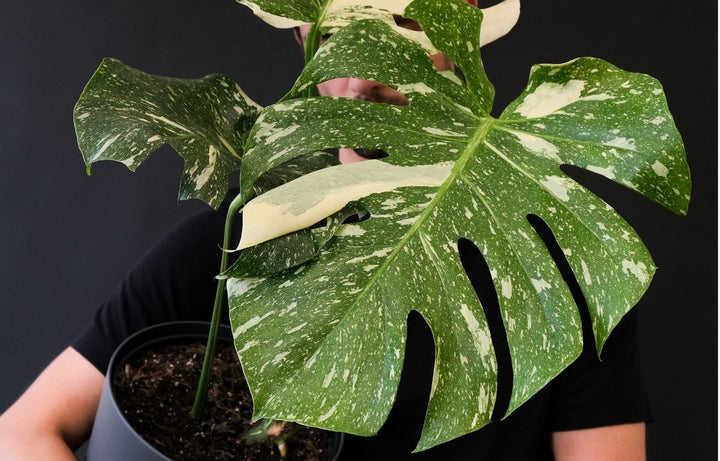
Thai Constellation Monstera
Thai Constellation Monstera
The Thai Constellation Monstera also known as Monstera Deliciosa Thai Constellation has gained immense popularity among plant enthusiasts due to its stunningly unique appearance and rarity.
Cultivated for the tropical rain forests of Thailand, The Thai Constellation Monstera thrives in warm and humid environments and has a unique variegated patterning that is reminiscent of a starry night sky, hence the name.
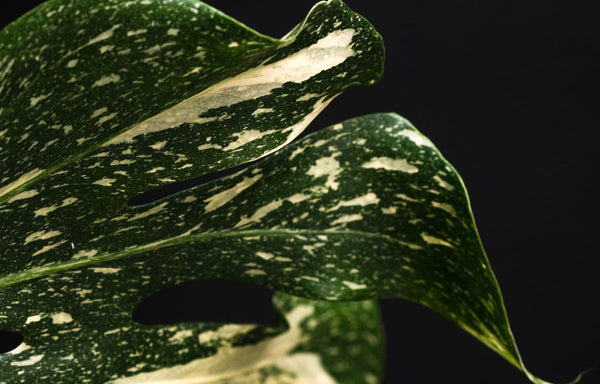
Unique Variegation
The Thai Constellation Monstera is known for its striking variegation and large fenestrated dark green leaves, which feature speckled cream or light yellow patterning. This variegation pattern is highly distinctive and visually appealing, making the plant stand out among other Monstera varieties.
The Thai Constellation Monstera was first cultivated through selective breeding and gene mutation done in Thailand research laboratories during the 1990s and is not a naturally occurring mutation. It is in fact, an intermixing of genes between the Monstera Deliciosa and Epipremnum Pinnatum.
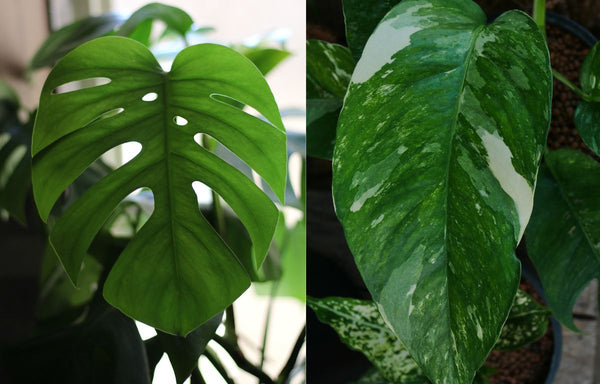
Limited Availability
Given the man-made nature of the plant, seedlings can only be formed from the tissue culture of an existing Thai Constellation Monstera, making it slow to grow with limited distribution, contributing to scarcity and increased demand.
Although they are still incredibly rare compared to the Monstera Deliciosa or other variegated varieties, Thai Constellation Monsteras are more widely available due to node propagation. In most places worldwide, plant enthusiasts should be able to purchase or order a plant from a specialist nursery in their area.
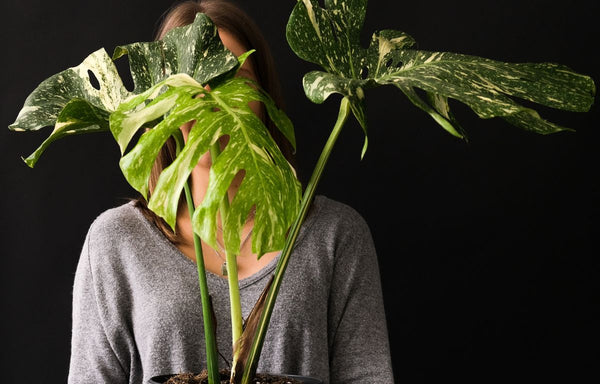
Social Media Exposure
Social Media platforms have widely been connected with the spread of indoor plant trends for beginner and advanced plant enthusiasts alike, with the ability to upload, like and share images with like-minded individuals and groups all around the world.
Where the plant used to largely be admired by plant experts and horticulturalists, in recent years, the Thai Constellation Monstera has been given a bit of a re-birth into a broader social consciousness, heavily increasing its upward trending popularity, desirability, and for better or for worse, its exclusivity.
In addition, it is also gaining recognition within the aesthetics community with significant regard for its striking visual appeal as a replacement for artistic design features, complimenting both modern and traditional interior and exterior styles.
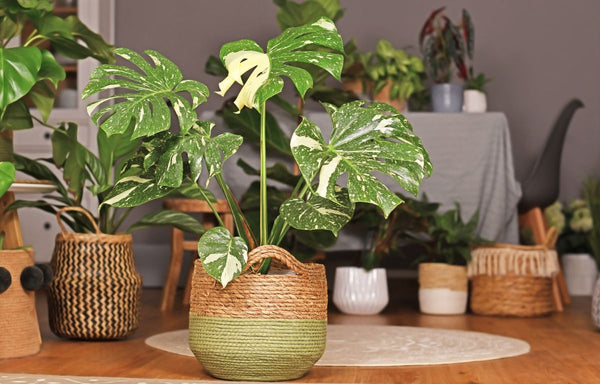
Collectors' Appeal and Plant Value
Like with any collector, be it stamps or cars, the crowning piece is usually the rarest and most difficult-to-sort-after item, regardless of its visual appearance. A high value often accompanies it because of its rarity, which drives up demand among collectors looking for unique and hard-to-find items. It is precisely the same for plant collectors.
Plant collectors are also drawn to rare and unusual specimens that can become focal points in their collections. Although stunning in appearance, the Thai Constellation's unique variegated patterning and scarcity make it an attractive addition to any collectors' displays.
As Thai Constellation Monsteras are such a specialised plant, availability and cost are difficult to regulate. If you Google 'Thai Constellation Monster for sale in Australia', prices fluctuate widely.
The average cost for a single node cutting seems to be around $20-$50 AUD, and upwards of $200 AUD for a rooted node with decent foliage. An established plant of around 18-30cm can vary between $300-$550 AUD, whereas a mature plant can sell anywhere between $600-$1,300 AUD depending on the size, variegated patterning and demand.
To put this into perspective, a Monstera Deliciosa of 20cm in size can easily be picked up at your local nursery for a maximum cost of $50 AUD.
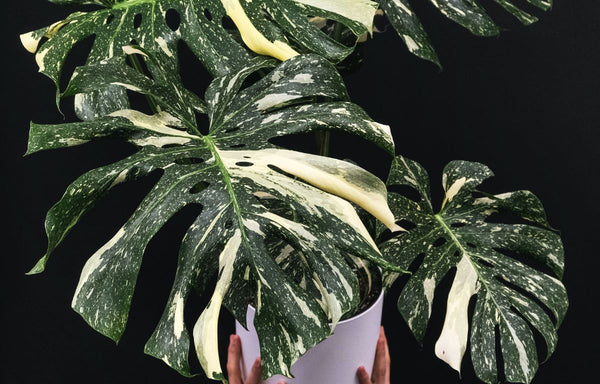
Propagation and Trading
If you are lucky enough to get your hands on one, propagating not only helps expand the popularity of the Thai Constellation Monstera, but it makes it readily available and more affordable to more plant enthusiasts and collectors. You can propagate from a node or even a single leaf, but only roots formed from nodes will eventually grow to become full adult plants.
- Select a stem with a few nodes and at least one aerial root.
- Divide the stem by making a clean cut below each node.
- Allow the cutting to air dry for a few hours.
- Optionally, apply rooting hormone to the cut end.
- Plant the cutting in a well-draining seedling or propagation potting mix, burying the node in the soil.
- Enclose the cutting in a clear container or under a plastic bag for increased humidity.
- Place it in bright, indirect light and maintain humidity by misting or using a humidity dome.
- Keep the soil lightly moist while roots develop over several weeks to months.
- Once the roots are healthy and strong, the plant can be moved into a pot with suitable soil.
- Soil Propagation yields the best results, but there is also a simple Water Propagation method. Read our blog Propagation Monster: Tips and Tricks For Success.
Successful propagation requires careful attention to detail and patience. Not all cuttings may succeed, so taking multiple cuttings increases your chances of success. The variegated patterning is genetically stable, meaning each successfully grown node will produce a new plant with the specked variegated patterning.
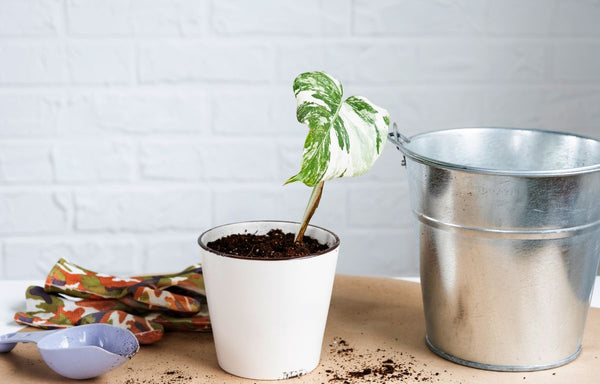
Challenges of Cultivation
While the Thai Constellation Plant is captivating, it also presents challenges in terms of care. Its variegated leaves are more light-sensitive and may require specific care conditions to maintain their appearance. This along with the higher price point makes it a rewarding challenge recommended for dedicated plant enthusiasts.
- The Thai Constellation Monstera loves dappled or indirect sunlight that simulates their native tropical habitat. Provide more shade if the plant is partially exposed to hot summer sunshine.
- They prefer warm temperatures between 20-30C and high ambient humidity levels ranging from 60-70%.
- The Thai Constellation Monstera should be planted into a pot at least 7cm wider and taller than the root ball to allow unobstructed room to expand and breathe as the plant matures.
- When you water, ensure the soil and roots of the plant are thoroughly soaked through. The soil should feel completely dry or slightly damp to the touch beforehand.
- The best soil for water retention is a premium-grade potting mix with perlite or vermiculite. It should also be aerated to allow good airflow between the roots.
- Fertilise your plant every four weeks during the warm seasons to boost growth and leaf production.
- When your Thai Constellation Monstera matures, it will want to start trailing. Support it using a strong stake to prevent the stems from exaggerated bending and prevent the plant's leaves from becoming damaged or accidentally trodden on. Read our blog on using stakes to support your plant.
Even though it is their signature, it is also their downside. The variegated patterning of the Thai Constellation Monstera means that less of the plant is green, having less chlorophyll. Chlorophyll is essential for the plant to photosynthesis and convert sunlight into energy or food to grow. Those with more variegated patterning and larger cream sections will grow much slower than their greener counterparts.
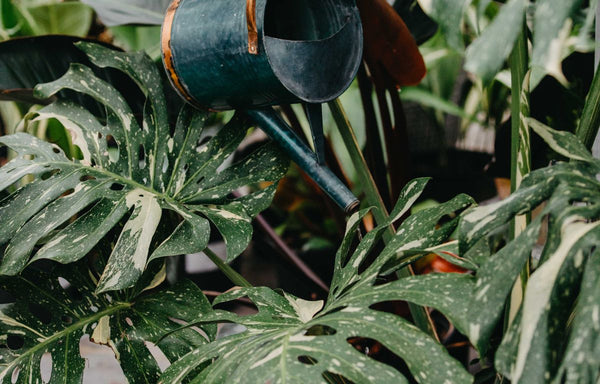
How does it differ from the Monstera Borsigiana Albo Variegata?
The Monstera Decliciosa Borsigiana Veriegata or Monstera Albo is another rare variegated Monstera genus. Native to the tropics of Central America, the Monstera Albo has smaller leaves and a stark white variegated patterning that contrasts with the natural dark green of the leaves. The variegation can appear as patches of colour but can also solidly cover half or even the entire face of a leaf completely white.
Unlike the Thai Constellation Monstera, the white patterning on the Monstera Albo is a natural mutation. As a natural mutation, the patterning is genetically unstable and hard to predict in new plants. This means that the variegated pattern is not always passed along when reproducing and may eventually lose the mutation altogether. It is also an incredibly slow-growing plant with fewer green sections that can absorb sunlight.
Having said that, it has been around longer than the Thai Constellation and is much more widely cultivated. Being more commonly available makes this variegated Monstera marginally less desirable to particular plant collectors, but a mature Monstera Albo can still fetch an eye-watering ballpark of $400-$1000 AUD.
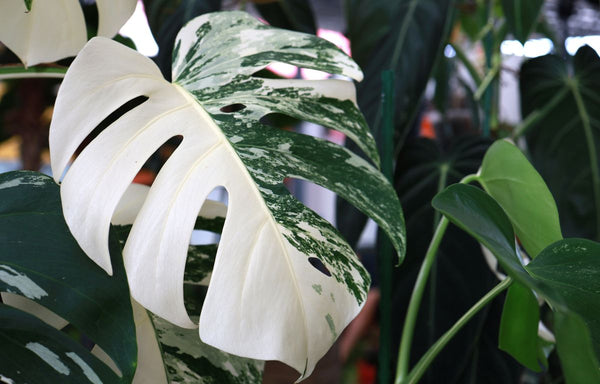
Word of Warning
It is becoming more commonplace to purchase plants online, and given the scarcity of the Thai Constellation Monstera, it is unlikely that you will see it in person before you buy. Be careful when purchasing sight unseen, especially from sharing platforms like Facebook Marketplace and Gumtree. Variegated Monsteras are hard to come by for a reason and are quite costly. You should purchase your plants from a reputable seller with independent customer reviews. They are more accountable for providing what they advertise and ensuring their plants are healthy. They will also know more about growing and caring for variegated indoor plants regardless of the variety and price.
The Thai Constellation Monstera has captured the hearts of plant enthusiasts around the world with its unique variegated patterning, and from its inception continues to be one of the most sought-after indoor plants to date. If you are lucky enough to get your hands on one, we wish you all the luck on a journey that will likely be as unique as the plant itself.
